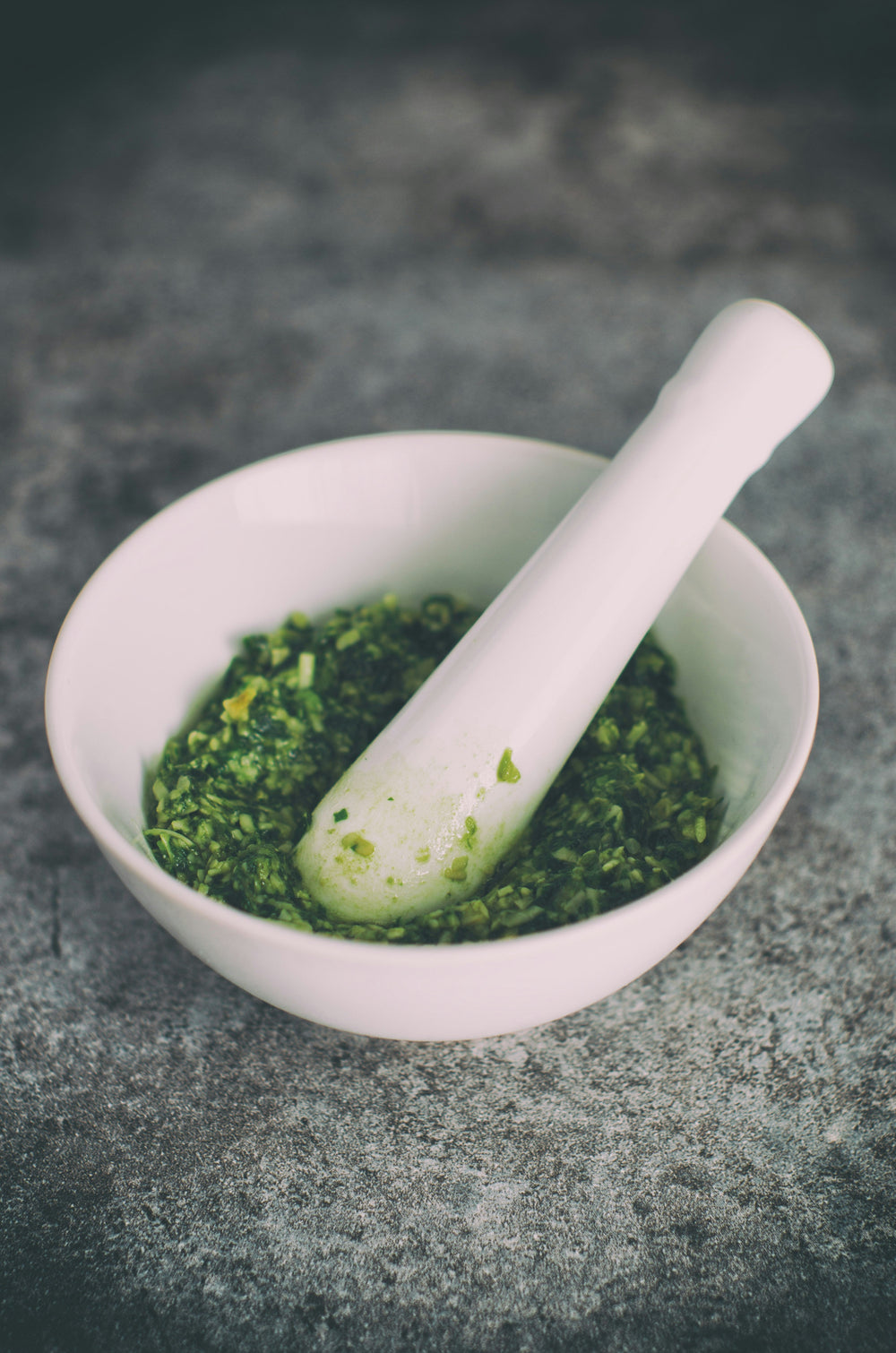This creamy green soup brings together broccoli, cauliflower, and kale for a delicious bowl that feels both comforting and energising. Finished with crispy chickpeas and toasted almonds, it is an easy way to enjoy a whole day’s worth of greens in one simple, nourishing meal.
enhancing digestion and alleviating symptoms of bloating and IBS.
The Science Behind Probiotics: Enhancing Digestion and Alleviating Symptoms of Bloating and IBS In the realm of digestive health, probiotics have emerged as a promising ally. These live microorganisms, often referred to as "good bacteria," play a crucial role in maintaining the delicate balance of our gut microbiota. Beyond their reputation as digestive aids, recent research has shed light on their potential to alleviate symptoms of bloating and Irritable Bowel Syndrome (IBS). Let's delve into the scientific evidence supporting the efficacy of probiotics in promoting digestive wellness. Aiding Digestion: Studies have shown that probiotics can enhance the digestive process by facilitating the breakdown of food and improving nutrient absorption [1]. By populating the gut with beneficial bacteria, probiotics help optimise gut health, leading to smoother digestion and reduced discomfort after meals. Alleviating Bloating: Bloating, characterised by a feeling of fullness and abdominal distension, is a common complaint among individuals with digestive issues. Research suggests that certain probiotic strains have the potential to alleviate bloating symptoms by reducing gas production and promoting gut motility [2]. This effect is attributed to the ability of probiotics to rebalance the gut microbiota and regulate fermentation processes. Managing IBS Symptoms: Irritable Bowel Syndrome (IBS) is a chronic gastrointestinal disorder characterised by symptoms such as abdominal pain, bloating, and altered bowel habits. Clinical trials have demonstrated that specific strains of probiotics can offer relief to individuals suffering from IBS [3]. These probiotics exert their therapeutic effects through various mechanisms, including modulation of gut microbiota composition and reduction of inflammation in the gastrointestinal tract. References: Plaza-Diaz, Julio, et al. "Evidence of the Anti-Inflammatory Effects of Probiotics and Synbiotics in Intestinal Chronic Diseases." Nutrients, vol. 13, no. 3, 2021, p. 789. doi:10.3390/nu13030789. Triantafyllou, Konstantinos, et al. "Probiotics in Irritable Bowel Syndrome: A Systematic Review." Journal of Functional Foods,...

The Science Behind Probiotics: Enhancing Digestion and Alleviating Symptoms of Bloating and IBS
In the realm of digestive health, probiotics have emerged as a promising ally. These live microorganisms, often referred to as "good bacteria," play a crucial role in maintaining the delicate balance of our gut microbiota. Beyond their reputation as digestive aids, recent research has shed light on their potential to alleviate symptoms of bloating and Irritable Bowel Syndrome (IBS). Let's delve into the scientific evidence supporting the efficacy of probiotics in promoting digestive wellness.
-
Aiding Digestion: Studies have shown that probiotics can enhance the digestive process by facilitating the breakdown of food and improving nutrient absorption [1]. By populating the gut with beneficial bacteria, probiotics help optimise gut health, leading to smoother digestion and reduced discomfort after meals.
-
Alleviating Bloating: Bloating, characterised by a feeling of fullness and abdominal distension, is a common complaint among individuals with digestive issues. Research suggests that certain probiotic strains have the potential to alleviate bloating symptoms by reducing gas production and promoting gut motility [2]. This effect is attributed to the ability of probiotics to rebalance the gut microbiota and regulate fermentation processes.
-
Managing IBS Symptoms: Irritable Bowel Syndrome (IBS) is a chronic gastrointestinal disorder characterised by symptoms such as abdominal pain, bloating, and altered bowel habits. Clinical trials have demonstrated that specific strains of probiotics can offer relief to individuals suffering from IBS [3]. These probiotics exert their therapeutic effects through various mechanisms, including modulation of gut microbiota composition and reduction of inflammation in the gastrointestinal tract.

References:
- Plaza-Diaz, Julio, et al. "Evidence of the Anti-Inflammatory Effects of Probiotics and Synbiotics in Intestinal Chronic Diseases." Nutrients, vol. 13, no. 3, 2021, p. 789. doi:10.3390/nu13030789.
- Triantafyllou, Konstantinos, et al. "Probiotics in Irritable Bowel Syndrome: A Systematic Review." Journal of Functional Foods, vol. 84, 2021, p. 104646. doi:10.1016/j.jff.2021.104646.
- Ford, Alexander C., et al. "Efficacy of Prebiotics, Probiotics, and Synbiotics in Irritable Bowel Syndrome and Chronic Idiopathic Constipation: Systematic Review and Meta-analysis." The American Journal of Gastroenterology, vol. 109, no. 10, 2014, pp. 1547–1561. doi:10.1038/ajg.2014.202.
In conclusion, the scientific evidence supporting the beneficial effects of probiotics on digestion, bloating, and IBS symptoms is compelling. Incorporating probiotic-rich foods or supplements into your daily routine may offer a natural and effective way to support gastrointestinal health. However, it's essential to consult with a healthcare professional before starting any new dietary regimen, especially if you have underlying health conditions. With further research and understanding, probiotics continue to hold promise as a valuable tool in the management of digestive disorders.
lifestyle. gut health recipes.
ready in 10 minutes
herb-whipped cottage cheese chicken bagels.
These basil whipped cottage cheese protein bagels make a fresh, high-protein breakfast or lunch, combining creamy herb-blended cottage cheese with juicy chicken, rocket, and tomatoes. They’re quick to assemble, packed with flavour, and perfect for a nourishing breakfast or light lunch.
ready in 10 minutes
kiwi chocolate protein chia pots.
These Kiwi Chocolate Protein Chia Pots make an ideal high-fibre, high-protein breakfast that keeps you full and energised all morning. They’re quick to prepare, easy to store, and perfect for a healthy grab-and-go option.
ready in 15 minutes
spiced apple porridge.
This spiced apple and pumpkin seed porridge is a warming, high-fibre breakfast that’s perfect for cosy mornings. Made with creamy oats, gently caramelised apples and a crunchy pumpkin seed topping, it’s ready in just 15 minutes and serves one.
ready in 50 minutes
prep-ahead baked blueberry oats.
These prep-ahead oven-baked oats with blueberries and bananas are rich in protein and fibre, making them a nourishing, gut-friendly breakfast to enjoy all week.
ready in 15 minutes
spicy green eggs with feta.
These spicy green eggs with feta are a quick, protein-rich recipe packed with gut-friendly ingredients like spinach, courgette, and spring onion. Baked in the oven or air fryer, they’re simple to make, full of flavour, and support digestion with a balance of fibre, protein, and healthy fats. Perfect for breakfast, brunch, or a light meal, this vibrant dish proves that nourishing your gut can be both delicious and easy.
ready in 10 minutes
egg wrap with pesto.
Bright, fresh, and ready in just 10 minutes, this flavour-packed wrap serves one and is ideal for breakfast, lunch, or any time you’re after something simple yet filling.
ready in 10 minutes
peach cobbler overnight oats.
Start your day with a gut-friendly twist on a classic dessert. The peach cobbler overnight oats serve 2–3 and takes just 10 minutes to prepare the night before. Packed with fibre, flavour and feel-good ingredients, it’s the perfect make-ahead option for busy mornings or a nourishing snack you can enjoy any time of day.
ready in 15 minutes
smoky egg salad bagel crunch.
This smoky harissa egg bagel is the perfect 15-minute meal. Made with creamy Greek yoghurt, tangy pickles, and a hint of spice, it’s a high-protein twist on classic egg salad that delivers on both taste and texture. Ideal for busy days, this easy bagel recipe makes lunch feel gourmet without the effort.
ready in 20 minutes
chewy breakfast matcha protein cookies.
Soft, satisfying, and subtly sweet—these breakfast cookies are made to fuel your morning the right way. With fibre-rich oats, plant-based protein, and antioxidant-packed matcha, they’re a gut-friendly grab-and-go option that doesn’t compromise on flavour or function.
ready in 15 minutes
lemon & poppy seed pancakes.
Emily's light, gut-friendly crêpes are the perfect balance of fibre, protein, and healthy fats to support digestion and keep you feeling great.
ready in 10 minutes
carrot cake breakfast oats.
Start your day with a delicious and nutritious breakfast option - Carrot Cake Oats. Filled with fibre diversity to promote healthy digestion.










































